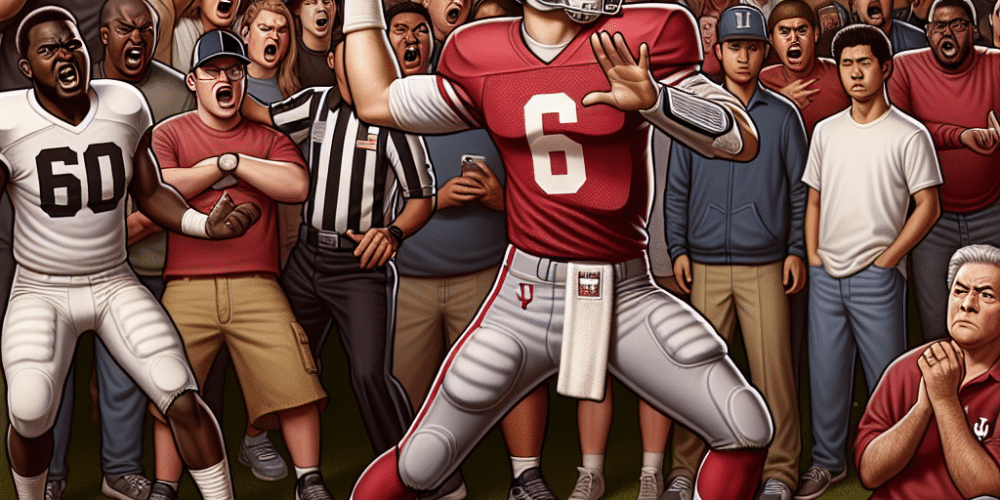Fernando Mendoza, the quarterback for Indiana University, expressed his apologies to sports bettors disappointed by betting outcomes that did not go their way. This apology was directed towards online gamblers who have been critical of student-athletes, blaming them for not meeting certain expectations during games.
Despite the criticism, Mendoza has been at the center of attention after Indiana University’s team secured a victory against Iowa from the Big Ten with a final score of 20-15 last Saturday. This win has allowed Indiana to maintain its status as an undefeated champion, with Mendoza’s performance being a significant contributor to the team’s success.
During the game, Mendoza seemed conscious of the betting landscape surrounding the event. He acknowledged the significant focus on the spread betting involving a seven-point difference. When he made the strategic decision to run back for safety, which resulted in the 20-15 scoreline, it was not due to any personal gain but rather an awareness of the heavy betting action on that particular spread.
Openly reflecting on the impact of his actions, Mendoza remarked, “I know I really cooked people’s spreads. My apologies to them.” This statement highlighted the delicate balance athletes must maintain in the face of betting pressures, recognizing that while some bettors might have lost, others potentially gained from his decisions on the field.
Mendoza’s candid comments also stemmed from frustration with the vitriol directed at college athletes by some segments of the gambling community. He seemed to suggest that while his apologies were genuine, they were also partly fueled by a need to address the ongoing verbal attacks on players.
In the context of college sports, the relationship between athletes and gambling is complex. The increasing popularity of sports betting has added a layer of scrutiny and pressure on student-athletes, with some bettors expecting these young players to perform in ways that align with their wagers. This dynamic can create an environment where athletes are unfairly targeted for events beyond their control.
While Mendoza’s actions during the game were not intended to influence betting outcomes maliciously, his acknowledgment of the situation sheds light on the broader issue of how gambling affects college sports. With the growing sports betting market, the potential for tension between gamblers and athletes is significant, yet Mendoza’s statement illustrates a desire to navigate this landscape responsibly.
However, not everyone sees Mendoza’s apology as necessary or appropriate. Some argue that athletes like Mendoza should remain focused solely on their performance and the integrity of the game, without feeling compelled to address the concerns of gamblers. From this perspective, the primary responsibility of college athletes is to their team and fair play, rather than external betting interests.
Indeed, this viewpoint stresses that athletes should not be held accountable for the financial decisions of others. The unpredictability of sports is part of what makes betting appealing and risky, and attempting to blame athletes for unfavorable outcomes can undermine the spirit of the game.
In contrast, supporters of Mendoza’s approach might argue that acknowledging the gambling element reflects a modern reality where sports and betting are increasingly intertwined. Being aware of this connection could foster a more responsible gambling environment, where bettors are reminded that the outcomes are uncertain and influenced by the genuine competitiveness of the sport.
The debate surrounding Mendoza’s comments is indicative of a larger conversation about the role of gambling in sports, particularly at the collegiate level. As sports betting becomes more mainstream, colleges and their athletes are navigating new challenges regarding expectations, pressures, and the potential impacts on both athletes and the integrity of sports competitions.
Moving forward, it will be crucial for universities, athletic departments, and regulatory bodies to address these concerns thoughtfully. Establishing guidelines and support systems for student-athletes may help mitigate the negative effects that gambling pressures can impose, ensuring that the spirit of college sports remains intact.
In conclusion, Fernando Mendoza’s interaction with the gambling community through his apology highlights a nuanced issue within college sports. While his remarks were intended to address and diffuse criticism, they also open the door for broader discussions about the relationship between sports and betting. As the landscape continues to evolve, finding a balance that respects the integrity of the sport while acknowledging the realities of modern gambling will be key to maintaining the health and fairness of college athletics.

















